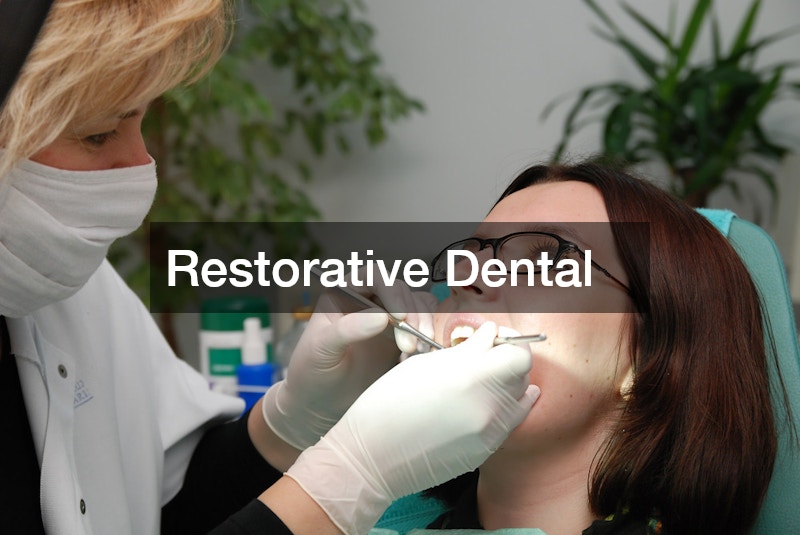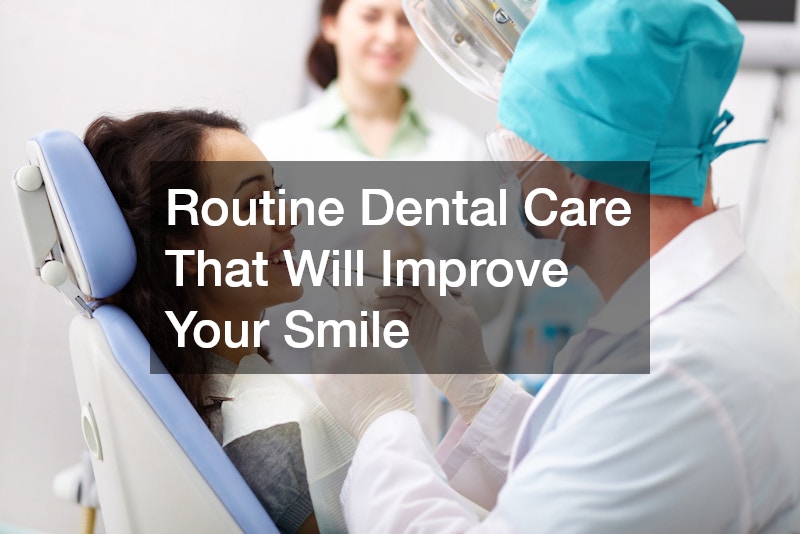
Maintaining good oral health is integral to overall well-being, and routine dental care plays a pivotal role in achieving this. While the value of routine dental care is often underestimated, it can prevent more serious health issues down the line. Many people fail to realize that the mouth is a gateway to the rest of the body and that dental issues can often lead to systemic problems. In this comprehensive guide, we delve into the myriad aspects of routine dental care, exploring key services available at a dental office. Such services include cavity fillings, dental cleanings, and restorative dental procedures, all designed to maintain and restore a healthy smile. We will also examine specialized procedures such as urgent care provided by a local pediatric dentist, the marvels of modern dental implants, and cosmetic enhancements like teeth whitening performed by a cosmetic dentist. Through this exploration, we aim to highlight the importance of routine visits to your dental office, fostering an understanding of the preventive and restorative benefits of regular dental care. By committing to routine dental appointments, individuals can enjoy not only improved oral health but also contribute to their overall health and quality of life.
Cavity Filling

Cavity filling is one of the most common procedures undertaken during routine dental visits, addressing decay that has developed on a tooth. The primary objective of cavity filling is to restore the damaged tooth to its normal shape and function. By regularly visiting a dental office, patients can prevent cavities from growing larger and leading to more severe dental issues.
The procedure generally involves removing decayed material from the tooth followed by cleaning the affected area and then filling it with a suitable material such as composite resin or amalgam. This restoration not only protects the tooth from further decay but also helps maintain the edifice of the tooth structurally, a critical service offered by your restorative dentist.
Routine dental check-ups are crucial as they allow for early detection of cavities. With the timely intervention provided by the filling process, the overall health of the tooth is preserved. Attending a dental office for routine dental care can prevent the need for more extensive procedures down the line, preserving your oral health.
Cleanings
Regular dental cleanings are a cornerstone of preventive healthcare, helping to maintain oral hygiene and prevent dental diseases. During a routine dental cleaning, a dental hygienist or dentist will remove plaque and tartar build-up that is not accessible through regular brushing and flossing. This process helps avert cavities and gum diseases, ensuring your teeth remain healthy and strong.
Apart from plaque removal, dental cleanings also involve polishing the teeth to remove surface stains. This not only improves the appearance of the teeth but also makes it harder for plaque to accumulate in the future. By consistently visiting your dental office for cleanings, you engage in a proactive approach to maintaining oral health.
Regular dental cleanings, as part of a routine dental schedule, enhance the overall health of your teeth and gums. Comprehensive cleanings enable the early detection of potential issues such as cavities and gum diseases. They provide a critical opportunity for the dentist to detect any early signs of potential issues, preventing severe oral problems if attended to promptly.
Restorative Dental

Restorative dentistry plays a crucial role in the rehabilitation of your teeth and gums, intended to bring back your smile’s optimal function and aesthetics. Whether addressing cavities, fractures, or missing teeth, a restorative dentist is skilled in a variety of procedures aimed at restoring oral health. Regular consultations with a restorative dentist are essential as part of your routine dental care.
Restorative procedures might include fillings, root canals, crowns, bridges, and dentures. These interventions are aimed at repairing structural problems and replacing missing teeth, resulting in improved functionality and aesthetics. Routine dental visits allow the dentist to assess the condition of previous dental work and maintain its effectiveness over time.
Routine dental check-ups facilitate early diagnosis and treatment of issues that may necessitate restorative interventions. This proactive approach minimizes the severity and extent of the restorations needed, benefiting both your health and your wallet. Investing in routine dental care ensures issues are detected and treated early, preserving your natural teeth as much as possible.
Urgent Care
Urgent dental care is a vital component of maintaining oral health, addressing issues that arise unexpectedly such as dental trauma or severe pain. A local pediatric dentist can offer specialized care for children requiring immediate attention, emphasizing the importance of having an accessible dental office for emergencies. Routine dental appointments help in preventive care that can avert many potential emergencies.
Urgent care services might be required for problems such as toothaches, abscesses, or broken teeth. Quick response and treatment are crucial to alleviate pain and prevent further complications. Regular routine dental visits ensure that any underlying issues are detected early, thus minimizing risks and promoting long-term health.
Having a routine dental regimen helps reduce the occurrence of emergencies, cultivating a healthy environment for both children and adults alike. By understanding the critical role of a local pediatric dentist and the scope of urgent care services, individuals can better manage and prevent dental emergencies. Establishing a relationship with your dental office through regular visits makes it easier to address emergencies swiftly and effectively when they arise.
Teeth Whitening
Teeth whitening is a popular cosmetic procedure aiming to lighten teeth and remove stains or discoloration. Conducted by a cosmetic dentist, this procedure enhances the aesthetic appeal of your smile, increasing confidence and self-esteem. While not typically covered by routine dental insurance, teeth whitening is a common practice in a comprehensive dental regimen.
The process involves bleaching the teeth to remove extrinsic and intrinsic stains, often resulting from diet, lifestyle, or natural aging. Routine dental visits offer the perfect opportunity to explore professional whitening options that are safer and more effective than over-the-counter products. Whitening teeth regularly can improve the aesthetics of one’s smile while boosting overall satisfaction with dental care.
Consistent whitening treatments, offered as part of routine dental services, ensure teeth remain bright and free from stains. Partnering with a cosmetic dentist during routine visits allows for the safe and monitored use of whitening products. This proactive approach ensures optimal results and prevents damage to the enamel by relying on professional guidance.
Extractions

Extractions are sometimes necessary, especially in the case of impacted wisdom teeth or teeth that cannot be repaired through restorative dentistry. Wisdom teeth extraction is a common procedure that prevents potential issues such as pain, infection, and damage to adjacent teeth. Routine dental visits allow for the monitoring of wisdom teeth development to determine the need for such extractions.
An oral surgeon typically performs extractions, ensuring that the removal is conducted safely and efficiently. Routine consultations with your dental office enable proper planning and timing for any necessary extractions, minimizing potential complications. Understanding the role that extractions play within routine dental care helps patients make informed decisions about their oral health trajectory.
Regular visits to your dental office provide an opportunity to assess the need for extractions, ensuring the overall alignment and health of your teeth. Extractions, when performed as part of a routine dental care plan, help maintain oral health stability by removing problematic teeth before they cause issues. Routine assessments and early interventions contribute to a healthier dental future.
Implants
Dental implants represent a revolutionary solution for those who have lost one or more teeth, restoring both function and aesthetics. Implants are surgically placed in the jawbone by an oral surgeon, providing a stable foundation for replacement teeth. Routine dental visits are pivotal to assessing jawbone health and determining suitability for implants.
Implants offer a long-term solution, closely mimicking the look and feel of natural teeth, and they help preserve the bone structure, which is vital for keeping other teeth in place and maintaining facial structure. As part of routine dental care, assessing candidacy for implants involves thorough examination and treatment planning to ensure optimal results.
Routine follow-ups after implant placement are critical for monitoring integration and addressing any potential issues early. These regular appointments within a dental office help to ensure the longevity and success of the implants. Emphasizing the importance of routine dental checks aids in achieving enduring results and maintaining overall oral health.
Bridges
Dental bridges are another common restorative option designed to replace one or more missing teeth, effectively bridging the gap. This procedure involves anchoring artificial teeth to adjacent natural teeth or implants, enhancing both function and appearance. Regular evaluations during routine dental check-ups help maintain the integrity and function of bridges.
Bridges help restore the ability to chew and speak properly, distribute bite forces evenly, preventing remaining teeth from drifting, and maintain the shape of your face. As a part of routine dental services, placement and maintenance of bridges guarantee long-term usability and aesthetic preservation. Working with a restorative dentist during regular visits ensures that bridges are correctly fitted and maintained.
Routine dental appointments allow for adjustments that might be necessary over time, ensuring the bridges remain comfortable and functional. With routine evaluations, dentists can quickly address any potential issues, extending the life of your bridges significantly. Committing to regular visits is essential for optimizing the effectiveness of dental bridges, ensuring that they contribute positively to your oral health strategy.
Oral Surgery
Oral surgery encompasses a range of procedures performed by an oral surgeon to address complex dental issues and improve oral health. From simple extractions to more extensive surgeries like jaw realignment or treatment of severe dental infections, routine dental check-ups facilitate early diagnosis and intervention.
Oral surgeon-led procedures may be required for impacted teeth, oral cancer biopsies, or advanced periodontal disease treatments. As a component of a rigorous routine dental care program, oral surgery helps maintain oral health and rectify conditions that standard restorative approaches cannot address. Delaying surgical intervention can prolong discomfort and complicate treatment.
Routine assessments help identify when surgical intervention is necessary, allowing for timely and effective treatment. Regular cooperation with your dental office ensures effective pre- and post-operative care, contributing to optimal recovery and results. Adhering to routine dental check-up schedules prevents minor issues from requiring more invasive surgical solutions.
Dental Bonding

Dental bonding stands out as a versatile cosmetic procedure performed by a cosmetic dentist to address imperfections like chips, cracks, or gaps in teeth. The bonding process involves applying a tooth-colored resin material to the surface, shaped and polished to match surrounding teeth. These enhancements significantly improve aesthetics without extensive dental intervention.
Through the inclusion of dental bonding in routine dental care, minor aesthetic issues can be swiftly corrected, enhancing the overall appearance of your smile. Regular evaluations within a dental office facilitate the maintenance of bonding work, ensuring it retains its appearance and structural integrity over time. Consulting with a cosmetic dentist for bonding services can starkly augment one’s dental routine.
The durability of dental bonding requires periodic maintenance, achievable through routine dental appointments. These check-ups ensure no underlying issues undermine the expected longevity of the procedure, allowing for prompt adjustments if necessary. By incorporating dental bonding into routine dental planning, individuals can consciously elevate the aesthetics and health of their smiles seamlessly.
Conclusion
In conclusion, routine dental care encompasses a comprehensive suite of services essential for maintaining and enhancing oral health. By engaging in regular visits to a dental office, individuals proactively prevent and address dental issues. From cavity fillings and cleanings to more sophisticated procedures like dental implants and orthodontic solutions, routine dental care integrates a range of preventive and restorative practices. Moreover, cosmetic procedures such as teeth whitening and dental bonding add a unique charm by elevating the aesthetics of one’s smile.
Empowering both children and adults alike through routine check-ups, brushing, and professional cleanings, a thriving oral health regimen offers substantial benefits, reflected both in one’s smile and general health. Access to urgent care, including wisdom teeth extraction and emergency services provided by a local pediatric dentist or oral surgeon, ensures thorough coverage against unexpected dental crises. By committing to routine dental care and prioritizing these regular interactions with skilled professionals, individuals can cultivate a diligent and effective approach to their dental health strategy.
Ultimately, the wide array of specialized dental services outlined in this guide underscores the importance of routine dental visits. They facilitate early detection, timely intervention, and sustained oral health outcomes. Thus, integrating comprehensive dental care practices into daily life is paramount for supporting not only optimal oral health but also general well-being.




